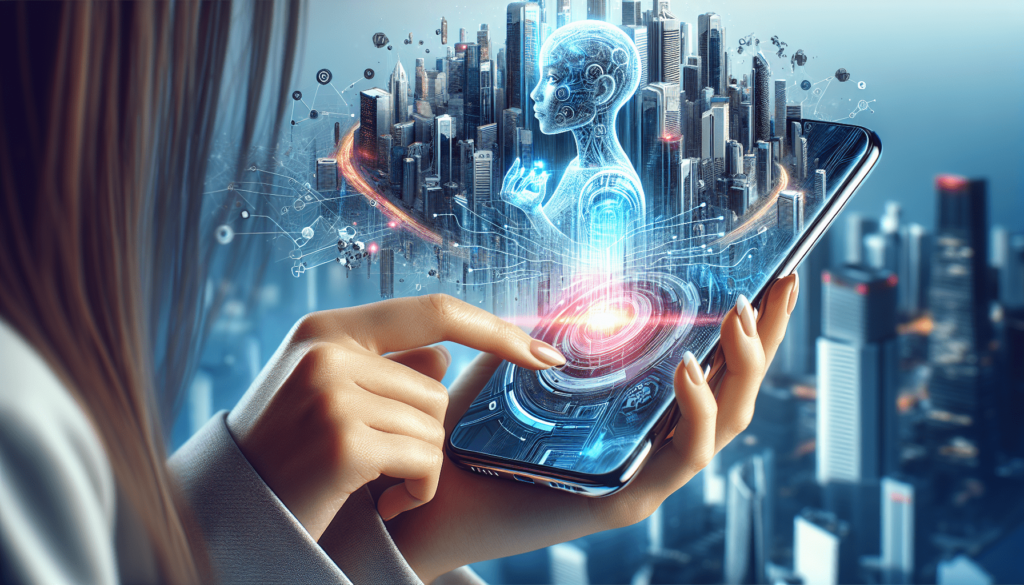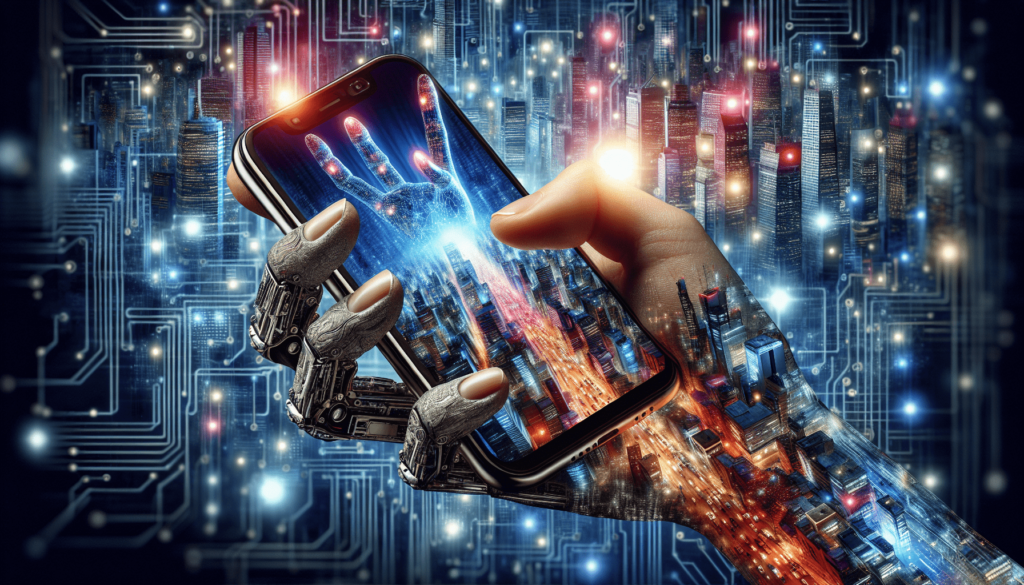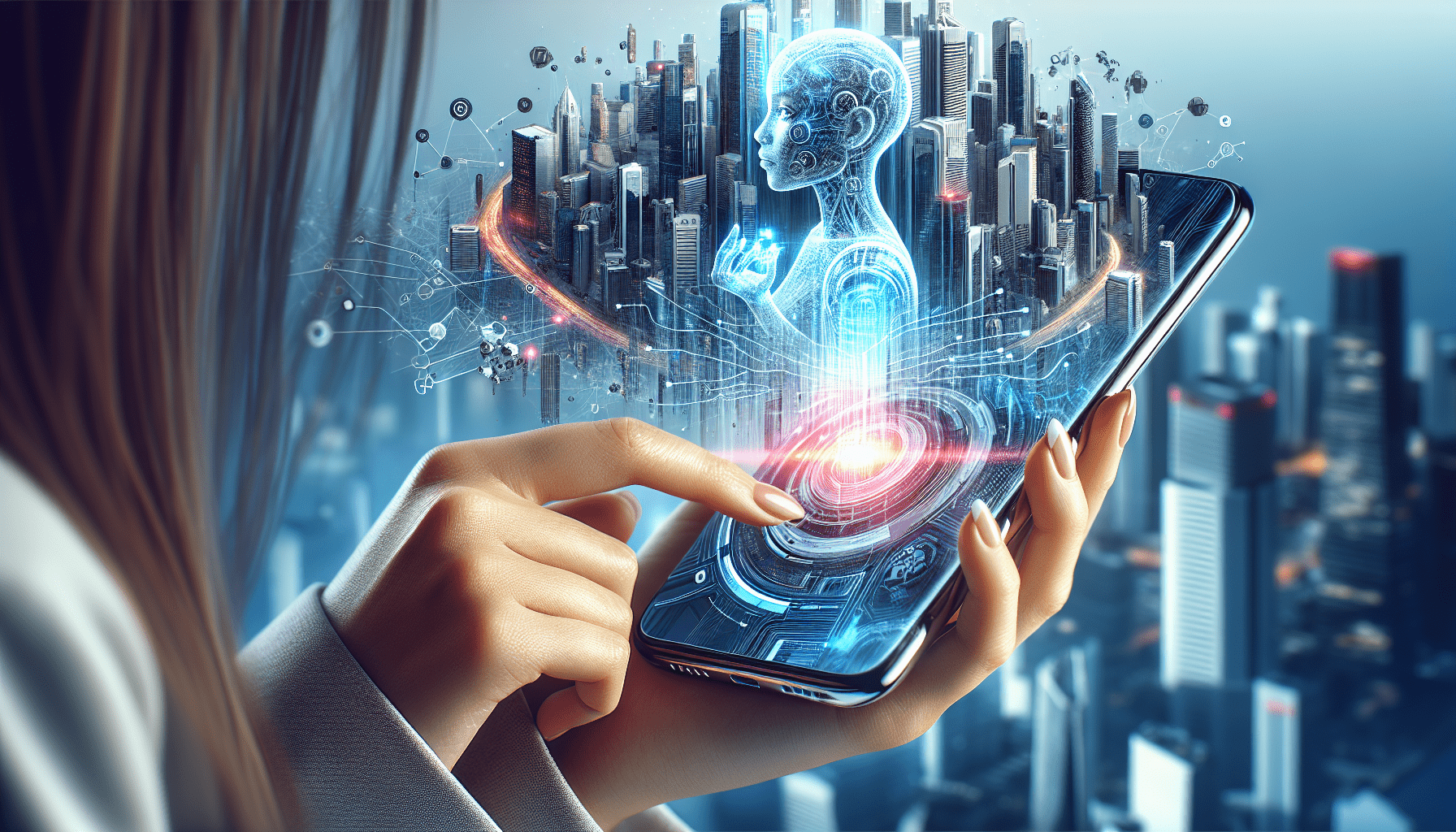Imagine a world where machines can mimic human intelligence and perform tasks with astonishing precision and accuracy. This is the realm of artificial intelligence (AI), a rapidly evolving technology that has the potential to revolutionize various aspects of our lives. But what exactly does AI do to humans? It presents a double-edged sword, providing both tremendous opportunities and grave challenges. From enhancing our daily lives to transforming industries, the implications of AI on humanity are vast and complex. In this article, we will explore the ways in which AI influences us, shaping our future as it continues to advance at an unprecedented pace.

1. Enhances Efficiency and Productivity
1.1 Automates Tasks and Processes
Artificial Intelligence (AI) has significantly enhanced efficiency and productivity by automating various tasks and processes. AI-powered systems can perform repetitive and mundane tasks with high accuracy and speed, freeing up valuable time for human workers to focus on more complex and creative work. For example, customer service chatbots can handle basic customer inquiries, allowing human agents to handle more complex issues and provide personalized assistance. AI-powered automation systems can also streamline manufacturing processes, reducing errors and increasing production rates.
1.2 Speeds up Decision-Making
AI plays a crucial role in speeding up decision-making processes across various industries. By leveraging vast amounts of data and advanced algorithms, AI systems can analyze complex information quickly and provide actionable insights. This enables businesses to make informed decisions more efficiently, ultimately leading to improved outcomes. AI-powered analytics tools can help organizations uncover patterns and trends in consumer behavior, allowing them to tailor their strategies and offerings accordingly.
1.3 Streamlines Operations
Implementing AI technologies can streamline operations and optimize workflows. AI systems can analyze operational data in real-time and identify areas for improvement, such as optimizing supply chain logistics or predicting maintenance needs. This allows businesses to reduce costs, minimize downtime, and improve overall operational efficiency. AI-based predictive analytics can also help in resource allocation, ensuring that companies allocate their resources effectively and avoid unnecessary waste.
2. Creates Job Displacement
2.1 Automation of Routine and Repetitive Jobs
While AI brings tremendous benefits, it also creates concerns regarding job displacement. Automation technology powered by AI has the potential to replace routine and repetitive jobs traditionally performed by humans. Jobs in industries such as manufacturing, retail, and transportation that involve repetitive tasks are particularly susceptible. However, it’s important to note that AI-driven automation not only replaces jobs but also transforms job roles, creating new opportunities for skill development and career growth.
2.2 Shifts in Job Market Demands
The adoption of AI technologies leads to shifts in job market demands. As certain tasks become automated, there is a growing need for workers skilled in areas such as data analysis, machine learning, and AI system maintenance. This shift demands that individuals adapt and acquire new skills to remain relevant in the job market. Upskilling and reskilling programs become crucial for workers to stay competitive and thrive in the evolving job landscape.
2.3 The Need for Upskilling and Reskilling
As AI and automation reshape job roles, individuals need to upskill and reskill to remain employable. The demand for workers with expertise in AI and related fields is rapidly increasing. Upskilling programs can equip individuals with the necessary skills to work alongside AI systems, ensuring they continue to contribute value to their organizations. Additionally, reskilling initiatives can help individuals in industries heavily impacted by automation transition into roles that complement AI technologies.
3. Enables Personalized Experiences
3.1 Customized Product and Service Recommendations
AI enables businesses to deliver personalized product and service recommendations to customers. By analyzing vast amounts of data on individual preferences, behavior, and purchase history, AI systems can accurately predict and suggest products and services tailored to each customer’s unique needs. This not only enhances customer satisfaction but also boosts sales and strengthens customer loyalty.
3.2 Tailored Advertising and Marketing
AI-powered algorithms can analyze customer data and provide valuable insights for targeted advertising and marketing campaigns. By understanding customer preferences and behavior patterns, businesses can create highly tailored and personalized advertising strategies. This approach increases the effectiveness of marketing efforts, as ads are more likely to resonate with the target audience, leading to higher conversion rates and return on investment.
3.3 Hyper-Personalized Virtual Assistants
Virtual assistants, powered by AI, offer hyper-personalized experiences by understanding individual preferences and providing tailored assistance. These intelligent assistants can perform tasks based on voice commands and learn from user interactions, continuously improving their ability to meet user needs. They can schedule appointments, navigate through tasks, and provide personalized recommendations, making daily life more convenient and efficient.
4. Raises Ethical and Privacy Concerns
4.1 Data Privacy and Security
The widespread use of AI raises concerns about data privacy and security. As AI systems rely on vast amounts of data, organizations must ensure they handle and protect this data ethically and securely. Stricter data protection regulations are being implemented to safeguard individuals’ privacy and prevent misuse of personal information. It is crucial for organizations to implement robust security measures to mitigate the risk of data breaches and uphold the trust of their customers.
4.2 Bias and Discrimination
AI algorithms can unintentionally perpetuate biases and discrimination present in the data they are trained on. If the data used to train AI models contains biases, the resulting outputs may reflect those biases as well. This can have unintended consequences, such as discriminatory hiring practices or biased decision-making in criminal justice systems. Ensuring fair and unbiased AI systems requires careful data selection, diversity in training datasets, and ongoing monitoring and regulation to prevent discriminatory outcomes.
4.3 Autonomy and Control
As AI systems become more advanced, concerns arise regarding the autonomy and control they possess. Questions surrounding the accountability of AI systems for their actions and decisions come into play. It is important for organizations and society to establish ethical frameworks and regulatory measures that govern the development and deployment of AI. Ensuring transparency, explainability, and accountability in AI systems is crucial to maintain human control and prevent potential misuse or harmful consequences.

5. Improves Healthcare and Medicine
5.1 Early Disease Detection and Diagnosis
AI technologies have revolutionized healthcare by enabling early disease detection and diagnosis. Machine learning algorithms can analyze vast amounts of patient data, including medical records and diagnostic images, to identify patterns and anomalies. This allows for earlier detection of diseases such as cancer and provides physicians with valuable insights to make accurate diagnoses and develop appropriate treatment plans.
5.2 Precision Medicine and Treatment Planning
AI-driven precision medicine has the potential to transform healthcare by tailoring treatments to individual patients. By analyzing genetic and clinical data, AI algorithms can identify specific biomarkers and genetic factors that contribute to individual health conditions. This knowledge allows healthcare professionals to develop personalized treatment plans that are more effective and have fewer side effects, improving patient outcomes and quality of life.
5.3 Enhanced Medical Research
AI has the capability to accelerate medical research by analyzing vast amounts of scientific literature, clinical trials, and patient data. AI algorithms can identify patterns and correlations that may not be immediately apparent to humans, leading to new insights and discoveries. This accelerates the development of new treatments, drugs, and medical technologies, ultimately benefiting patients and advancing the field of medicine.
6. Transforms Education and Learning
6.1 Adaptive Learning and Personalized Education
AI-powered adaptive learning systems have the potential to revolutionize education by tailoring learning experiences to individual students’ needs and abilities. By analyzing students’ performance data and learning preferences, AI algorithms can personalize educational content and suggest appropriate learning resources. This approach maximizes learning outcomes by addressing individual strengths and weaknesses, ensuring students receive targeted support and progress at their own pace.
6.2 Intelligent Tutoring Systems
Intelligent tutoring systems leverage AI to provide personalized and interactive learning experiences. These systems can simulate a human tutor by adapting their teaching methods based on individual student responses and progress. AI-powered tutors can offer real-time feedback, identify areas of improvement, and provide additional resources, improving student engagement and understanding. Intelligent tutoring systems can support both traditional classroom settings and online learning environments.
6.3 Efficient Administrative Processes
AI technologies streamline administrative processes in educational institutions, allowing educators and staff to focus more on teaching and student support. AI-powered systems can automate administrative tasks such as grading, scheduling, and record-keeping. This reduces administrative burdens, saves time, and improves overall efficiency. Additionally, AI can assist in curriculum development and resource allocation, optimizing educational programs and ensuring maximum effectiveness.
7. Influences Creative Industries
7.1 AI-Assisted Artistic Creation
AI has made significant advancements in assisting and enhancing artistic creation. Artists can leverage AI-powered tools to generate unique and innovative artwork, music, and designs. These tools utilize machine learning algorithms that learn from existing artistic styles and create new pieces based on patterns and preferences. This collaboration between human creativity and AI technology opens up new possibilities for artistic expression and pushes the boundaries of traditional creative processes.
7.2 Music and Film Recommendation Systems
AI-powered recommendation systems have transformed the music and film industries by offering personalized content suggestions. By analyzing user preferences, listening habits, and viewing history, AI algorithms can recommend music and movies that align with individual tastes. This enhances user experiences, introduces users to new content, and facilitates the discovery of lesser-known artists and filmmakers.
7.3 Automated Content Generation
AI plays a role in automating content generation in various creative industries. For example, AI algorithms can generate news articles, create marketing materials, or even develop computer-generated characters for animations and games. While automation can reduce the time and effort required for content creation, there is a need to balance automation with human creativity to ensure the quality and authenticity of the final output.
8. Reshapes Transportation and Mobility
8.1 Autonomous Vehicles
AI-driven autonomous vehicles have the potential to revolutionize transportation and mobility. Self-driving cars and trucks can enhance road safety, reduce congestion, and improve fuel efficiency. By utilizing sensors, machine learning algorithms, and advanced navigation systems, autonomous vehicles can navigate roads, interpret traffic conditions, and make real-time decisions. However, challenges such as legal regulations, ethical considerations, and infrastructure requirements need to be addressed for widespread adoption.
8.2 Traffic Management and Optimization
AI can optimize traffic management by analyzing real-time data and making intelligent decisions to alleviate congestion and improve transportation efficiency. Smart traffic control systems powered by AI can adjust traffic signal timings based on traffic flow, identify alternative routes, and predict traffic patterns. Such systems help reduce travel time, minimize environmental impact, and enhance overall traffic management.
8.3 Last-Mile Delivery Solutions
AI plays a significant role in transforming last-mile delivery, which is the final stage of the delivery process from a distribution center to the destination. AI-powered delivery solutions can optimize route planning, minimize delivery time, and improve customer experience. These systems leverage machine learning algorithms to analyze various factors such as package size, delivery volume, and traffic conditions to ensure efficient and timely deliveries.
9. Facilitates Scientific and Technological Advancements
9.1 Accelerating Research and Development
AI accelerates research and development processes in various scientific and technological fields. AI-powered algorithms can analyze vast amounts of data, identify patterns, and generate hypotheses that researchers can then explore further. This expedites experimentation and discovery, enabling scientists to make breakthroughs in healthcare, physics, chemistry, and many other domains.
9.2 Data Analysis and Pattern Recognition
AI excels at data analysis and pattern recognition, enabling scientists and researchers to gain valuable insights from complex datasets. By utilizing AI algorithms, researchers can analyze large volumes of data more efficiently, uncover hidden patterns, and make connections that may have been missed using traditional methods. This leads to advancements in fields such as genomics, climate science, and drug discovery.
9.3 Robotics and Automation
AI-driven robotics and automation technologies have transformed industries such as manufacturing, agriculture, and logistics. Robots equipped with AI algorithms can perform tasks that are repetitive, dangerous, or require high precision. This improves operational efficiency, reduces human error, and enhances workplace safety. AI-powered robots can perform complex assembly procedures, autonomous farming tasks, and intricate surgical procedures, pushing the boundaries of what is possible in these fields.
10. Cultivates Ethical AI Development and Deployment
10.1 Responsible AI Governance
The development and deployment of AI technologies require responsible AI governance to ensure ethical practices. Ethical guidelines and standards need to be established to guide the development, deployment, and use of AI systems. This includes considerations such as privacy protection, fair treatment, transparency, and accountability. Collaborative efforts between governments, organizations, and experts are essential to shape responsible AI governance frameworks.
10.2 Accountability and Transparency
Ensuring accountability and transparency in AI systems is crucial to build trust and mitigate potential risks. Organizations must be transparent about how AI systems make decisions, what data is used, and how biases are addressed. Additionally, mechanisms for accountability should be in place to hold individuals and organizations responsible for the actions and outcomes of AI systems. Open communication and disclosure of AI practices are essential for fostering public trust and ensuring responsible AI implementation.
10.3 Collaborative Industry Efforts
Collaborative efforts between industries, researchers, policymakers, and ethicists are essential for cultivating ethical AI development and deployment. By working together, stakeholders can address the challenges and concerns associated with AI technologies. These collaborations can lead to the development of shared ethical standards, responsible practices, and frameworks for AI regulation. By prioritizing ethical considerations, the development and deployment of AI can be guided by principles that protect individuals’ rights and promote societal well-being.
